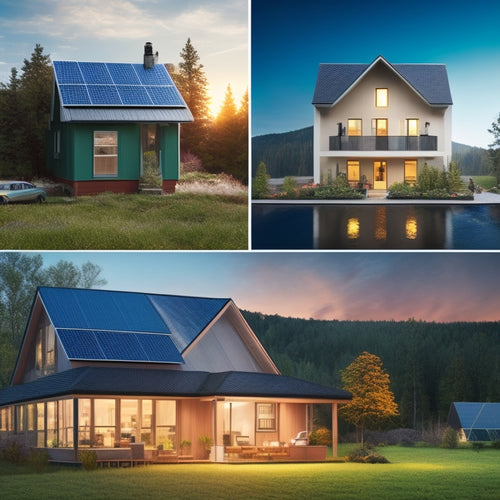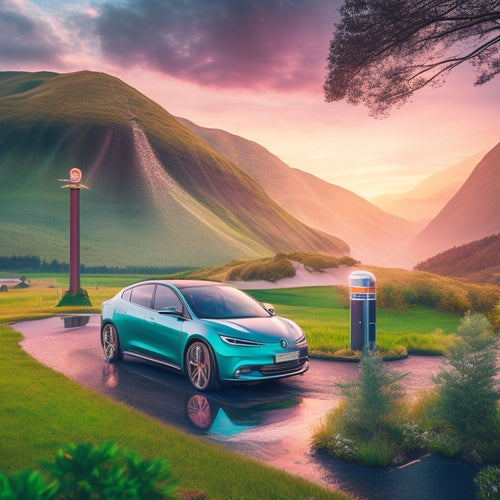
Electric Car Sales Struggle Amid Rising Demand
Share
Despite record electric vehicle sales in 2023, the industry is facing a plateau, with sales stagnating at around 9% of the new car market. Concerns about the pace of EV adoption have been sparked, as dips in sales have been observed at the start of the year. Although consumer interest in electric vehicles is at an all-time high, mainstream buyers remain hesitant due to concerns over charging infrastructure and cost. To accelerate mainstream adoption, addressing these issues is vital. As the industry navigates the complex landscape of EV production, pricing, and profitability, a deeper exploration of the challenges and strategies at play is necessary to understand the future of electric vehicles.
Key Takeaways
• Despite record sales in 2023, electric vehicle sales have plateaued at around 9% of the new car market, sparking concerns about adoption pace.
• High prices and limited charging infrastructure are major hurdles to mainstream adoption, despite growing consumer interest.
• The average EV price has dropped to $50,798, but carmakers face a delicate balance between affordability and profitability.
• Industry challenges, such as production costs and labor negotiations, are impacting the transition to electric vehicles.
• Tesla's aggressive price cuts have disrupted industry pricing dynamics, making it harder for other automakers to balance growth and profitability.
EV Sales and Market Trends
Despite setting a record in 2023 and expected to do so again in 2024, electric vehicle (EV) sales have recently leveled off at around 9% of the new car market, with dips in sales at the start of the year. This plateau has sparked concerns about the pace of EV adoption.
Consumer concerns, particularly regarding charging infrastructure, are likely contributing to this slowdown. The lack of extensive charging networks and range anxiety are significant barriers to widespread adoption. Moreover, high prices and limited model options also deter potential buyers.
As the industry navigates this plateau, addressing these concerns will be essential to reviving growth and achieving mainstream adoption.
Mainstream Adoption Challenges
Consumer interest in electric vehicles is at an all-time high, yet mainstream buyers like Joshi remain hesitant, citing concerns over charging infrastructure and cost as significant barriers to adoption.
Despite peak levels of consumer interest, EV availability, and affordability, mainstream adoption is slow.
Early adopters have paved the way, but mainstream buyers are cautious due to lingering doubts about charging infrastructure and cost.
The hybrid car's journey to mainstream acceptance, which took over two decades, serves as a reminder that EV adoption will take time.
Addressing consumer concerns around charging infrastructure and cost will be essential to accelerating mainstream adoption.
Pricing and Profitability Concerns
With the average electric vehicle (EV) price dropping to $50,798 from over $66,000, the industry faces a delicate balance between making EVs more affordable to boost demand and preserving profit margins.
The profitability outlook for automakers is uncertain, as lower EV prices would boost demand but hurt carmakers' profits. Most EVs sold are in the premium segment, with truly affordable EVs being scarce.
Tesla aims to design cheaper next-gen vehicles for broader adoption, but this approach may compromise profitability. Pricing strategies will be vital in balancing growth and profitability in the EV market.
As the industry navigates this challenge, finding the best price point will be key to sustaining profitability while driving mainstream adoption.
Industry Challenges and Strategies
Legacy automakers face significant hurdles in shifting to electric vehicle production, as they grapple with reconciling the higher production costs of EVs with the need to maintain profitability.
Industry profitability is a pressing concern, as EV production costs weigh heavily on the bottom line. To mitigate this, companies like Volkswagen are emphasizing flexibility and compromise in scaling up EV production. Others are focusing on value over volume in their EV strategy, sacrificing market share for higher profit margins.
As the industry navigates this delicate balance, Tesla's aggressive price cuts are disrupting pricing dynamics, forcing traditional manufacturers to rethink their approach.
Transition to Electric Vehicles
How can automakers balance the need to drive growth in electric vehicle sales with the imperative to maintain profitability, as they navigate the intricate shift to electric vehicles?
The change to electric vehicles poses significant challenges for automakers, who must balance growth with profitability. Key issues include:
Labor negotiations: The shift to electric vehicles impacts labor agreements, with the UAW playing an important role in shaping the EV market transformation.
Production challenges: Automakers face production challenges, including higher costs and lower profitability compared to gas-powered cars.
Pricing pressures: Tesla's aggressive price cuts impact industry pricing dynamics, making it difficult for other automakers to maintain profitability.
Profitability concerns: Many automakers, including VW, Ford, and GM, are not profitable on their EVs, making it essential to find a balance between growth and profitability.
Frequently Asked Questions
Will Government Incentives Boost Electric Car Sales in the Future?
Remarkably, EV sales set a record in 2023, despite current struggles. Government incentives can boost electric car sales in the future by fostering consumer trust and highlighting environmental benefits, ultimately driving adoption.
How Will the Rise of EVS Affect Traditional Gas Station Businesses?
As electric vehicles rise, traditional gas station businesses must adapt by diversifying their business models, incorporating fuel alternatives, and investing in charging infrastructure to remain competitive and sustainable in a shifting energy landscape.
Can Fast-Charging Networks Keep up With Increasing EV Adoption?
As EV adoption accelerates, fast-charging networks face scaling challenges, necessitating robust infrastructure expansion, including Electric Highways, to guarantee seamless charging experiences, mitigating range anxiety and supporting widespread electric vehicle integration.
Will Autonomous Vehicles Accelerate the Shift to Electric Cars?
Like a conductor harmonizing disparate instruments, autonomous vehicles will orchestrate a symphony of Vehicle Synergy, accelerating the shift to electric cars through Autonomous Integration, as seamless interactions between vehicles and infrastructure optimize efficiency, range, and user experience.
How Will Electric Vehicle Batteries Be Recycled and Reused?
As the electric vehicle (EV) market grows, sustainable battery disposal and recycling become vital. Green mining, a responsible extraction process, is essential for sourcing critical battery materials, while closed-loop recycling enables the reuse of valuable components, minimizing waste and environmental impact.
Related Posts
-

10 Best WiFi Outlets for Tracking Home Energy Usage
You can optimize your home's energy usage with the right WiFi outlets, which provide real-time monitoring and control...
-

What Does Your Home Energy Audit Report Reveal?
Your home energy audit report reveals a detailed analysis of your energy consumption patterns, highlighting areas of ...
-

5 Ways Geothermal Power Boosts Electric Vehicle Efficiency
You're likely unaware that geothermal power can greatly enhance your electric vehicle's (EV's) performance, range, an...


